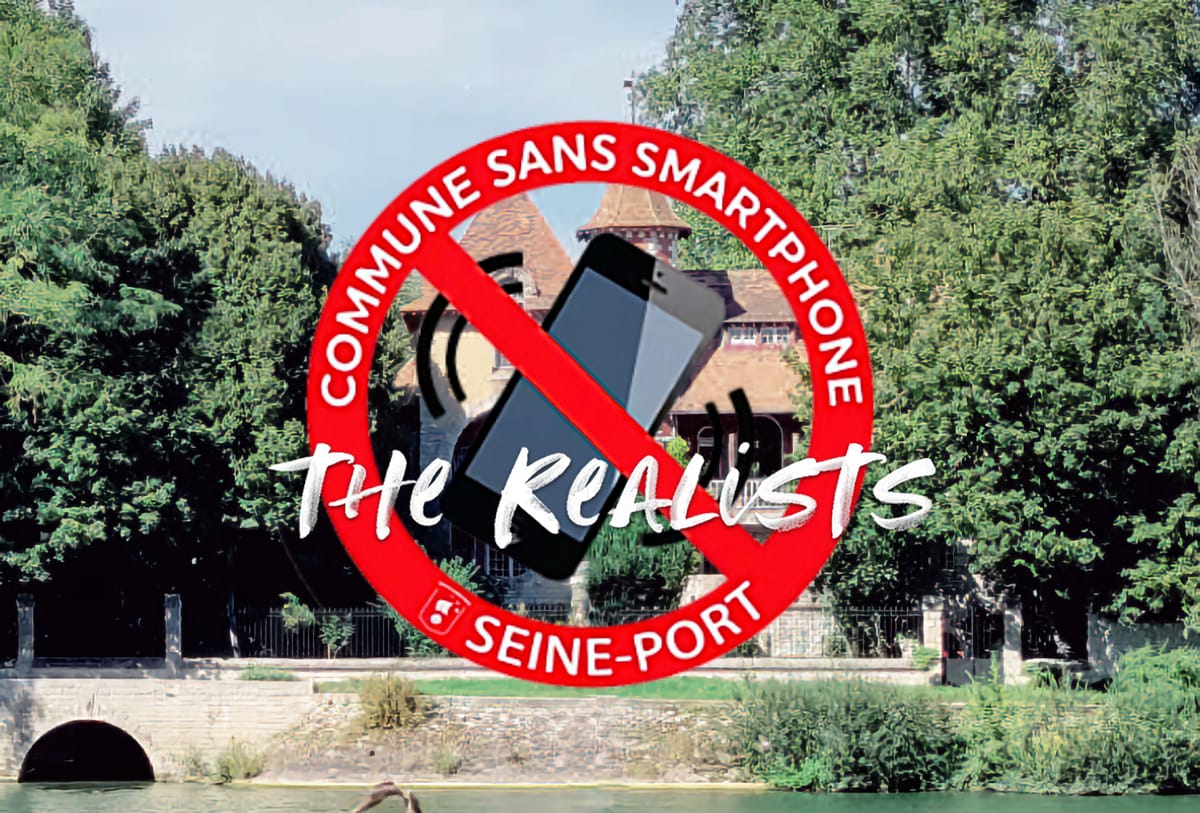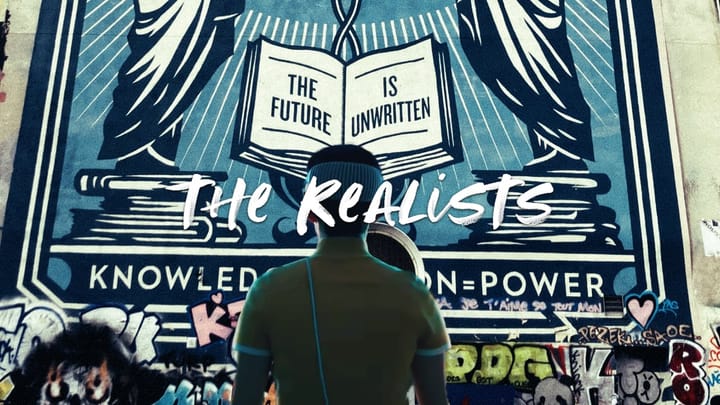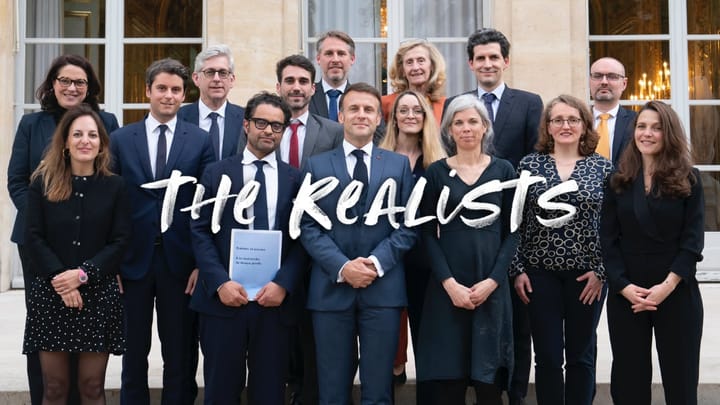The Small Town in France Aiming to Kickstart a Global Conversation about Phone Addiction
It's not a ban - but the start of a movement to make excessive screen time distasteful

"A silent epidemic" is how Vincent Paul-Petit - mayor of Seine-Port, a small town south of Paris, France - describes the screen addiction that is plaguing the inhabitants of his town: from children, to adolescents and adults. “We're dealing with a truly widespread addiction. To think that a teenager spends an average of 8 hours a day behind the screen… is considerable.” Paul-Petit continued: "There are a few dozen minutes devoted to educational subjects or subjects of interest to their education, the rest are games, social networks, messages of no interest that clutter their minds and prevent kids from concentrating on the essentials of their lives."
And so mayor Paul-Petit took action: in early February, he ran a referendum asking his town’s inhabitants whether smartphone scrolling should be restricted in certain public areas.
54% of voters said yes.
Cue: countless articles in small and big publications, in France and abroad, talking about a "smartphone ban" in public in a world first. Outraged soon followed: in the comments section of articles about this topic, most readers denounced an attack on personal freedoms. Some mocked the small town’s voters, saying they were old and out of step with the times.
Missing the point
Most reactions missed the larger point: Seine-Port's referendum was symbolic, attempting to kickstart a conversation about phone addiction and what to do to curb it. There will be no sanctions or fines for people breaking the rules in the town. But Seine-Port's inhabitants will now be keenly aware that excessive scrolling and social media use out in public will be frowned upon.
As mayor Paul-Petit explained:
[There are] places in the public space where we have restricted the use of smartphones, which seem to us to respond to issues of social life and safety for children: in front of schools, parents need to talk to each other and children need to see children talking to each other, that seems essential to me. In a public park, when there are three of us on a bench and everyone is fixated on his or her screen... When you're on the street asking for directions, instead of asking another passer-by where the bakery, the town hall, or a public service is, and you're on your GPS at the risk of falling.
Here is the banner that the town created:

It reads: "Let's protect our children. Screen-free town."
France and its initiatives to protect children from the harms of Big Tech
I applaud Paul-Petit's initiative as a crucial conversation starter. And I am not surprised this debate is taking place in France - a country whose government has been taking active steps to rein in tech giants and to combat against the most toxic, damaging sides of our brave new technological world.
Some examples:
- cell phones were banned in French schools in 2018 on all school premises, including the playground and during break times
- child influencers in France are protected by a 2020 labor law, in the same way as child actors and models. Their earnings are protected (their parents cannot claim them) and child influencers can ask for all their content to be deleted with the "right to be forgotten" - even without parental consent
- during a press conference last month, French President Emmanuel Macron talked about the need to seize back control from excessive screen time, as a priority for his government
President Macron stated:
Each generation of French people must learn what the Republic means: a history, duties, rights, a language, a deep sense of respect and commitment, and we must do this from childhood, by reinforcing the support and demands we place on parents, and by regaining control from our screens, which all too often confine us where they should liberate us. On the basis of recommendations to be made by the experts I brought together last week, we will determine the proper use of screens for our children, at home and in the classroom, because the future of our societies and our democracies depends on it.
Seine-Port’s mayor Paul-Petit is already one step ahead, running a pioneering awareness program in his town.
According to The Guardian:
The village has also approved a charter for families on children’s use of screens: no screens of any kind in the morning, no screens in bedrooms, no screens before bed or during meals. If parents of teenagers sign a written agreement not to give their child a smartphone before the age of 15, the town hall will provide the child with an old-fashioned handset for calls only.
Fighting the Status Quo
It’s exhausting to be a pioneer.
France is a traditionalist country and whenever you attempt to come up against the status quo or established traditions, you are often met with mistrust, skepticism or outright hostility. I see this in the public reactions to mayor Paul-Petit’s initiative. And I have experienced it myself since moving to France several years ago.
I firmly believe that 10 years from now this initiative by Seine-Port will be applauded - it will be seen in a positive light “of course screen time needed to be reined in! Terrific initiative.” I believe that in the France of 2035 wariness about screen time will be totally commonplace. But today - not so much.
Bien sûr, in theory people already agree that screen time should be limited, especially for children. But in practice? Not really. I’ve been nicknamed a “Taliban” “Putin” or “censor” for my efforts to keep my 3 year old screenfree. “But! It’s an educational program I’m watching!” “But, she can play with my locked smartphone, she doesn’t have the password” “It’s only a 5 minute video!” “It’s only a 10 minute video.” And on and on.
It’s interesting how, before becoming a mother, I would be the most conflict-avoidant person you would meet. Sure, I've always been an activist at heart, but with family and friends I was often afraid to create conflict or offend people. Afraid to ruffle feathers. Afraid to speak up. Friends and acquaintances nicknamed me the "gentle warrior."
Now, I don’t hesitate for a second to immediately remove my child from a room where the TV is on. Or to ask to switch it off. My parents - bless them - now move the kitchen TV to my old bedroom - on the floor, unplugged - when my child and I are visiting. And as soon as my toddler and I leave, the TV goes back to the kitchen and is often turned on for several hours a day, during and after meals. Not with us there. And I’m incredibly thankful for it.
Déjà vu: Being a Pioneer Isn't Easy
The fight to limit screen time - computers, mobile phones, tablets - is something else. Possibly because – and I get it – people can be personally offended, thinking you are accusing them to be addicted to screens. Like you are casting a judgement on them.
I’m reminded of the signs you often see at rallies - held by older people - who state “I can’t believe I still have to protest this s**t.” In this particular case, I have this strong familiar feeling of being in a fight people aren't ready to join quite yet. New fight. Old reactions.
It felt this way when I protested the media treatment of Nafissatou Diallo in the "Affaire DSK". Or the Cinémathèque’s celebration of Roman Polanski. Or the sexism and objectification of women in advertisements.
I remember being initially met with hostility, being told that I was overreacting. And then years later, hearing “No, I never said that! Of course DSK needed to face justice.” “I never said that! Of course we shouldn’t celebrate directors who escaped a trial for assaulting a young girl.” “Of course advertisements that openly objectify women are bad.”
If you are a pioneer in a fight against the status quo, against powerful entities, these reactions - and the future rewriting of history - are par for the course. The elegant approach is to let it go.
You can always celebrate change and small victories with your tribe. People who were on your side from the get go. Remember who they are. And nurture these connections - they invariably give you energy and motivation when you need to be fired up for the next (pioneering) fight.
As always, thanks for being here.
Elena
P.S.: Seine-Port is a 50 minute drive south of Paris - and conveniently, a 20 minute drive from my in-laws. I plan on visiting it soon to see what life is like there… and to talk to locals regarding the topic. I'll report back in a future post.
If you'd like to support my work, you could rent or buy my documentary The Illusionists.
Watch the trailer:





Comments ()